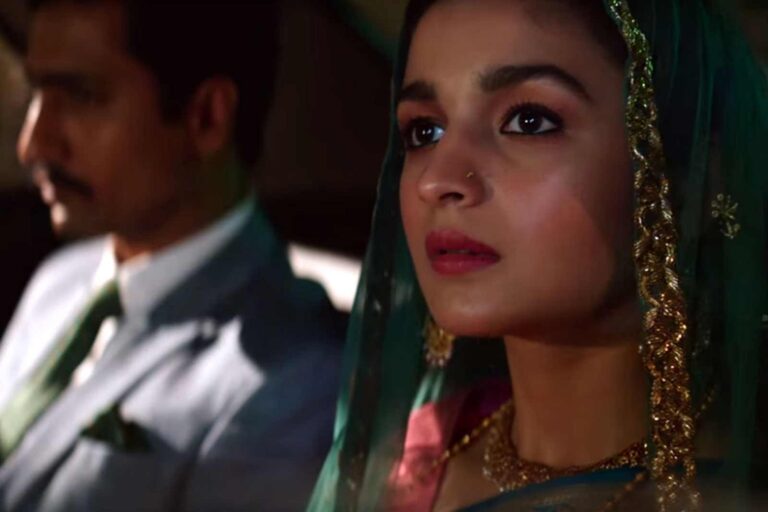RAAZI PORTRAYAL
Sripada Studios get you the brief on the film Raazi & explains the strength of Muslim women in the modern era
The strength of Muslim women in the modern era
NOTE: SPOILERS ALERT!
Have you watched the movie Raazi? If yes, then question yourself how you felt about the challenges faced by a young Muslim girl. If not, then let me brief you on the story.
A true story of the life of a 20-year-old Kashmiri girl is portrayed in this movie Raazi. Set in the year 1971, the movie which features a female protagonist was shot when the winds of war were blowing between India and Pakistan. The movie is inspired by the novel ‘Calling Sehmat’ written by Harinder Sikka.
Sehmat was the daughter of Hidayat Khan, who was posing as an informant for the Pakistani Government. Upon her father’s request, she got married at the age of 20 to Iqbal. The family into whom she was married were military officials of Pakistan. She was an undercover RAW (Research and Analysis Wing) agent. She had to face lots of struggle only to pass on the effective information to India. This was before the 1971 war between India and Pakistan. The innocent girl who was in college dropped out and was taught self-defence, shooting, martial arts and many other skills. Sehmat, who was a fast learner, also practised the Morse code.
After the marriage, she got well settled in Pakistan learning their culture, rituals and getting along well with the in-laws. Her father-in-law got promoted and the confidential reports were passing through their house. When she was passing the information regarding the attack on INS Vikrant, she was caught by one of the servants named Abdul, whom she had to kill for keeping her identity a secret.
When Iqbal finds the truth about his wife, he is heartbroken. When he confronts her to surrender, she uses the phrase “Watan ke aage Kuch Nahi, khud bhi nahi” This shows that she keeps her nation ahead of herself. During their conversation, there will be a grenade thrown at them, but she escapes her death. She later repents the death of her husband and requests Indian officials for her to come back to India. She will be pregnant with Iqbal’s child whom she will raise alone and make him a successful officer.

In the present world, women are growing stronger. There are very few fields where there are no signs of women. But we do notice the most successful Raja Easa Al Gurg, Mona Yousuf Almoayyed, Henadi Al Saleh, Shaikha Al Bahar and many other wonderful, successful Muslim businesswomen.
The sacred text of Islam, the Quran defines the social, spiritual and cosmological status of women. It also provides few guidelines for women. The basic view of Islam also preaches that humanity has been created in a pair, i.e., neither can be complete without the other. Ibn al Arabi is a spiritual teacher who has produced texts symbolizing the feminine principle in Islam. Osman Hamdi Bey is a painter whose works often show women engaged in educational activities.
The veil means anything from a face veil to a cloth draped over the head started decreasing in the early ’30s as a minority of Muslim women used it. As time passed by, the number of Muslim women wearing new head coverings increased, it got the name Hijab. Their appearances in public will include clothing such as burqa and hijabs.
Even though the world is emerging towards Modernization and Globalization, there can be few setbacks noticed even today. Even though Islamic women are allowed to work, they are subject to certain conditions. They have permission to work provided they do not violate the Islamic law such as serving alcohol and others. The main role of a Muslim woman is being a wife and a mother. Whatever practice they do, it must not affect their priorities. They are expected to put their role in the family first.
Saudi Arabia legalized driving for women in 2018, but women are not allowed to serve in the military as it is still illegal. Honour killing still prevails as an integral part of the law. The Jordanian penal code also has reduced the punishment of killing Muslim women over adultery. There are different laws applicable to women, in some cases, the testimony of two women equals that of one woman, but there are many gender-based testimonies where the statement of women is not accepted. In a few Muslim-dominated countries, there are still cases wherein property rights are granted only to upper-class women. Even though the women get the share in the property, there are chances that their share shall be unequal to that of the male siblings. Coming to the dressing of Muslim women, they wear burqa or hijab in public. There are certain places where such dressings are not allowed to maintain the decorum of that specific place.
There is still an argument going on if it is a good practice for rapists to marry their victims or not. Only in the Muslim dominated countries, Polygamy is allowed, i.e., one male can marry four females at the same time. It is legal for a man to pay some money only for a temporary spousal relationship, but vice-versa is illegal. Endogamy is followed in the majority, where they marry the one with whom they share their long-distance biological relationship. It is illegal and is forbidden to marry one’s brother, sister, etc. Islam has allowed girls of age 10 to be married, which is said not to be illegal.

The most amazing fact of Islamic law is that women are allowed to keep their family name and not their husband’s name after marriage. The women also have the freedom of not sharing the rights which they had before marriage, which includes property rights, jewellery, etc. She also has the right to demand payment for any domestic work she does. They also have the right to plead for separation in case the husband shall become domestically violent. The famous love stories of Laila-Majnu and Shah Jahan-Mumtaz stand above the other love stories. There is no compulsion for the non-Muslims to convert when they enter into marriage with the Muslims.
The beauty of women is referred to as the feminine element of God and they are respected the same way in the Islamic community. Just like all women, Muslim women stand strongly, equally, with all the strength to face anything that may come.
“Watan ke aage kuch nahi”



